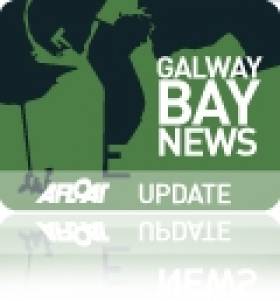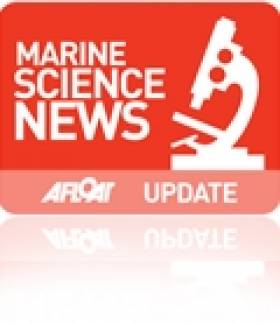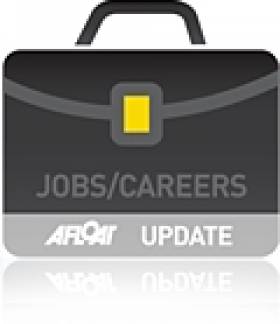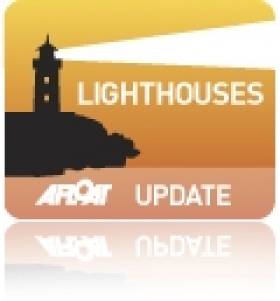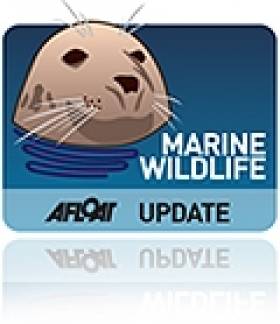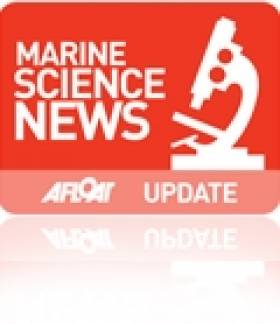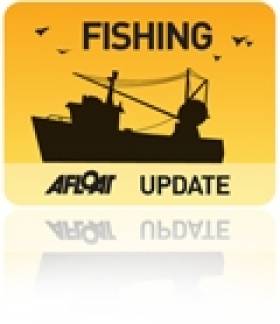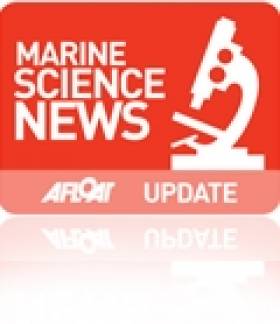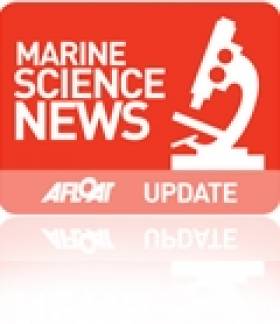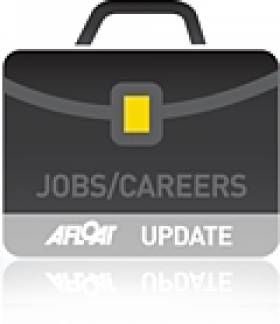Displaying items by tag: Marine Institute
Three’s A Crowd as Naval, Research and Cargo Ships Dock In Galway
Also sharing the basin but located closer to the dock gates was Arklow Shipping Ltd's Dutch registered dry-cargo vessel Arklow Surf (2000/2,316grt). The dock is capable of handling more vessels simultaneously and of course used as a host-port of the high-profile Volvo Ocean Race which is due to return next year.
Galway and neighbouring Limerick City with its Ted Russell Dock, are the only dock-gate accessed ports on the island of Ireland. In the case of Galway there is an exception as freight operations are also available from an outer pier on the seaward side of Dún Aengus Dock though only for domestic purposes. From this pier the dedicated Aran Islands freight service is operated by Lasta Mara TEO's Blath na Mara (1983/330grt). As for Limerick, vessels can also berth outside the dock but they tend to be small port-work related craft that use the outer berth on the Shannon Estuary.
The Galway Harbour Company in recent years have proposed plans for a new outer port, to be built in four stages with a completion date set for 2017. This would enable larger deeper drafted vessels such as tankers and cruiseships to dock in the new port. In the meantime cruiseships anchor off Mutton Island. In addition a freight rail-link, berthing for an inshore fishing fleet and a 216 berth marina are proposed.
To read more about the port proposals visit http://www.galwayharbour.com/news.php?id=11and for aerial visual impressions click HERE.
- River Shannon
- Marine Institute
- naval service
- Ports and Shipping
- Arklow Shipping Ltd
- Ports and Shipping News
- Aran Islands
- Island News
- Galway Bay News
- Marine Science News
- Dun Aengus Dock
- Galway Harbour Company
- Cruise Liner news
- Cruise ships
- Galway Harbour and Bay news
- Ted Russell Dock
- Marine Instistute Research vessels
- Lasta Mara TEO
Marine Institute to host ARCOPOL Oil Spill Modelling Workshop
The Marine Institute will be hosting an ARCOPOL oil spill modelling workshop in Galway on Tuesday 13 September.
This one-day workshop is an opportunity to discuss the development of common procedures, techniques and decision tools for the management of response to oil spills and other hazardous and noxious substances.
The event is being held at the Marine Institute, Rinville, Oranmore, Co Galway under the auspices of the EU Interreg Atlantic Area Project ARCOPOL, in which the Marine Institute is a participant.
For detailed information see the agenda which is available to download HERE.
All relevant professionals are invited; attendance is free but limited on a first-come-first served basis. Registration is mandatory by e-mail to [email protected].
The Stagiaire position is an excellent training opportunity for a recent graduate. The position will be based in Galway. For further information on description of the position, duration of contract and how to apply click HERE and note that the closing date is 12 noon on Friday 5th August 2011.
- Marine Institute
- marine science
- Research Vessels
- RV
- Marine Science News
- Marine Institute vacancies
- Marine vacancies
- Irish marine vacancies
- Irish marine careers
- Marine Institute Stagiaire Programme
- Marine Institute Oranmore
- Irish marine science news
- RV operations
- Jobs and Careers
- Irish marine jobs and careers
- Jobs and careers news
Irish Lights Appoint New Chief Executive
For the last 19 years Ms Shields has worked in the marine sector, most recently as Director of Strategic Planning and Development at the Marine Institute since 2004. In this role she had responsibility for oversight and management of the National Marine Research Programme, EU and International Policy and Programmes, Ocean Energy, Marine Technology and the Marine Data and Information Services Group of the Marine Institute.
Prior to this she held the position of Director of Science and Technology at the Marine Institute with responsibility for Research Vessel Operations, the National Seabed Survey, Oceanographic Services and the National Data Buoy Network. In addition she has worked in the marine tourism, aquaculture and private-forestry sectors.
- Ocean Energy
- Marine Institute
- Commissioners of Irish Lights
- Irish Lights
- Dun Laoghaire Harbour
- Yvonne Shields
- CIL
- Dun Laoghaire Harbour News
- National Marine Research Programme
- Marine Data and Information Services Group
- Director of Science and Technology at Marine Institute
- Marine Insitute Research Vessel Operations
Student On the Seas for Whale and Dolphin Survey
A mature student from the Galway Mayo Institute of Technology is taking part in the Irish Whale and Dolphin Group's Ship Surveys Programme.
Irish Weather Online reports that Enda McKeogh is on board the Marine Institute's research vessel Celtic Explorer off the west coast of Scotland, where he has already made a number of sightings of whales and dolphins.
He said: "I expected to be sea sick most of the time and not to see many cetaceans but this has proven not to be the case so far."
McKeogh is recording is sightings in a diary on the IWDG website HERE.
Waterford: Where Tallships and Science Meet
This was the RV Keary's first INFOMAR survey leg of 2011 and it was also the first time that both vessels have worked in tandem. The mapping of the estuary was from an area just west of the city's Rice Bridge to the open sea at the mouth of Waterford Harbour.
The estuary was mapped before in 2007 using the Marine Institutes larger vessel the RV Celtic Voyager, which covered the harbour approaches from the 10m contour to greater depth offshore. Both RV Keary and RV Geo overlapped their coverage with this previous data, producing a comprehensive and seamless seabed map of the area.
RV Keary is constructed of marine grade aluminium and was custom built in 2008 for the (GSI) by Veecraft Marine of Capetown, South Africa.
The 15m craft with a draft of just 2m is equipped with an extensive range of highly sophisticated technology. She has an open working area at the aft-deck to conduct operations and is licensed to carry up to 12 personnel. For further vessel characteristics click HERE.
The 34-tonne craft made her 7,000 mile delivery voyage from the African continent to Europe. She was firstly transported on the deck of a cargoship to Rotterdam. After unloading at the Dutch port the 22-knot capable craft set off with several calls along the UK south coast to include loading bunkers before finally reaching Dun Laoghaire, from where she entered service in April 2009.
Mussel Dredgers Make a Fleeting Trawl of Dalkey Sound
Two mussel dredger-trawlers made a rare transit of Dalkey Sound, last Friday, writes Jehan Ashmore.
The sound which is located to the south of Dublin Bay is not used by commercial traffic but is frequented by pleasure-craft, local fishing boats from Dun Laoghaire. In addition to occasional traffic by the Irish Naval Service, Marine Institute research vessel RV Celtic Voyager, the GSI's RV Keary and foreign tall-ships.
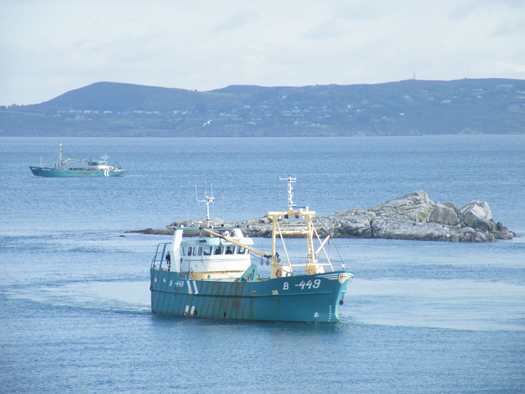
Dublin Bay. Photo Jehan Ashmore/ShipSNAPS
The vessels were making a southerly direction as they headed across Dublin Bay towards Dalkey Island. Mytilus lowered a mussel cage bucket into the sound which was dragged on two separate occasions over a short distance running parallel between the island and the coast.
The operation was all too brief as the Mytilus then proceeded into Killiney Bay followed closely astern by Branding. Upon entering the neighbouring bay, both vessels conducted dredging activity before continuing south beyond Bray Head.
Mussel grounds are located throughout certain hotspots in the Irish Sea and earlier this month, it is reported that there was a notable increase in mussel dredgers in Bangor, Northern Ireland. The dredgers were the Mytilus and Branding which berthed at the Co. Down harbour after a lengthy period of relative inactivity.
Mytilus was built in The Netherlands by Scheepwerf Van Os Yerseke B.V. and appeared in an episode of the successful BBC TV series 'Coast'. At the time of the broadcast she was registered at Beaumaris, Anglesey and was seen working in the northern approaches of the Menai Straits. The fishery grounds are ideally suited for the growing processes required in farmed mussel production.
Branding was also built by a Dutch shipyard, Kooieman in 1988 and her design is typical of the mussel dredgers based in Wexford. The market for mussels is mainly from the northern European countries of Belgium, France and the Netherlands.
- Dublin Bay
- Coast
- Marine Institute
- Northern Ireland
- naval service
- Dublin Bay News
- Anglesey
- Ports and Shipping News
- Island News
- RV Celtic Voyager
- TallShips
- RV Keary
- Geological Survey of Ireland
- GSI
- Mussel dredgers
- Mussel trawlers
- Mytilus
- Branding
- Dalkey Sound
- Fishery
- Menai Strait
- Beaumaris
- Banger
- Fish news
- BBC
- BBC TV series 'Coast'
- Belfastregistered
- Wexfordregistered
- Dutchbuilt
- Mussel markets
- Killiney Bay
- Bray Head
Prince Albert II of Monaco to Visit Marine Institute
Prince Albert's visit to the Marine Institute headquarters in Oranmore will be held on the final day of the visit on 6 April. Prior to that the prince will hold meetings with An Taoiseach, Enda Kenny, minister for the marine, Simon Coveney, minister for the environment, Phil Hogan and Dublin's Lord Mayor, Gerry Breen.
The Head of Monaco will open an exhibition in honour of his late mother at Farmleigh House and the prince will host a reception to highlight Irish literature and art. In addition to honouring the royal visit a state dinner will be held by President Mary McAleese.
The world's second smallest state is home to the Musée Océanographique de Monaco which has an impressive collection of aquariums. Though the principality is more synonymous with the hosting of Formula 1 Grand Prix. The event is at the end of May and is expected to attract a higher than usual number of cruiseships totalling 12 cruise-calls.
Mostly they will be on charter and accompanied by mega-yachts which are to dock at the outer pier or anchor offshore and along the French Riviera at Villefranche, Nice and Cannes. At the far side of summer Monte Carlo's Port Hercule is also to host the Monaco Yacht Show in September.
- Newport
- Marine Institute
- Co. Galway
- Monaco Yacht Show
- Cruiseships
- Ports and Shipping News
- Oranmore
- Galway Bay News
- Cruisecalls
- Prince Albert II
- Prince Albert of Monaco
- Prince Rainier III
- Princess Grace
- Grace Kelly
- Hollywood
- Port Hercule
- Principality
- Co.Mayo
- Charle Wittstock
- Formula 1
- Grand Prix
- Megayachts
- Musée Océanographique
Irish to Lead Europe in Research Vessel Productivity
These figures compare favourably with our European counterparts, reflecting a high level of activity on national and international research and monitoring programmes.
Work duties in 2011 for the Galway based vessels will range from fisheries surveys to underwater mapping and from climate studies to deepwater surveys with the remotely operated submersible ROV Holland 1. The work schedule will facilitate training missions and to carry out essential maintenance work on Ireland's network of data buoys that, in parallel to their research function, supply the vital information on which weather and shipping forecasts are based.
The increased activity of the research vessels reflects the growing imperative to understand and sustainably manage the economic potential of our offshore marine territories, an area over ten times that of Ireland itself.
A major role of the ships' workload will be commercial fish stock assessments. Together they are to devote 141 days on stock surveys in support of the sustainable management of Ireland's fisheries.
The RV Celtic Voyager will conduct underwater television surveys of valuable prawn stocks off the Aran Islands, the Irish and Celtic Seas, working on blue whiting, a survey of herring stocks in the north-west. In addition a comprehensive 54-day annual Irish Groundfish Survey which will take place in stages all around the Irish coast from September to December.
The survey will be the largest undertaken by an Irish research vessel and is essential to providing the scientific data used to inform the annual quota negotiations required in Brussels each year.
For the 2011 schedule for both vessels is available to view by clicking HERE and the Maritime Institute website click this link.
At 65.5m RV Celtic Explorer (2,425grt) accommodates 35 personnel and up to 21 scientists and 31.4m RV Celtic Voyager (340grt) with up to 8 scientists and a maximum endurance of 14-day days. For detailed technical specifications of the Dutch built vessels, RV Celtic Explorer, click here to download a PDF file and for the RV Celtic Voyager click here
For further information contact: Dr John Joyce, Communications Manager of Marine Institute on 087 2250871
Student Positions in Maritime Summer Bursary Scheme
The Bursary programme is a work experience scheme aimed at undergraduates of Universities, Institutes of Technology and National Institutes for Higher Education. The Bursary Scheme is strictly limited to undergraduates who have completed 2 years study in a relevant discipline. Below is a description of the positions and other details.
IMDO – Maritime Economics (2)
Two students are required to provide direct assistance in the key programmes of the Irish Maritime Development Office. The key programme areas include Business Development and Shipping Market Analysis supported by a strategic marketing programme. Two students will be required to co-ordinate research on market and economic issues in the Irish maritime industry and analyse data on competitor maritime jurisdictions.
The successful students will gain a broad knowledge of the maritime industry, international trade, maritime finance, and national shipping development. They will also gain a valuable insight into the national and international maritime transport sector and associated business services, along with experience in collating information and critical analysis.
The student should have good communication and analytical skills. An interest in international trade, business, economics or shipping and logistics is desirable but not essential. The student should be able to work independently and also as part of a team. The bursary will be based in MI-Harcourt Street.
For further information on the busary scheme you can download a PDF file from here and also download a PDF application form here. In addition information in general about the IMDO can be found by logging onto www.imdo.ie and the Marine Institute at www.marine.ie


























